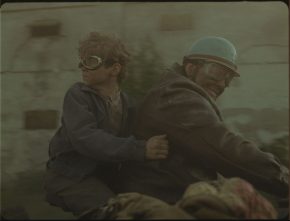Nightbitch is hands down one of the bravest and most exciting movies of the year! Directed by Marielle Heller, and based on Rachel Yoder’s novel of the same (superb) name, the film premiered at the Toronto International Film Festival (TIFF) and has been making waves ever since. Starring Amy Adams in one of her boldest and most surprising roles yet, Nightbitch is not just a film; it is an exploration of the often-overlooked, messy, and magical terrain of postpartum and perimenopause existence. It goes into the nitty gritty of what happens when motherhood collides with the primal instincts of a woman teetering on the edge of her identity – and “sanity”.
It is no coincidence that Marielle Heller helmed this project. Known for her nuanced portrayals, vivid and dynamic style in films like The Diary of a Teenage Girl, Heller’s personal connection to the material is evident. At the time of writing the adaptation, she was navigating life as a mother to a newborn and an older child, all while her husband was away working on a TV show. Much of the script, she admits, was written during her baby’s nap times—a fact that feels poetic considering the story’s themes of exhaustion, transformation and identity.
From MoMA to the Kitchen Floor
At its core, Nightbitch is about a woman struggling to reconcile her past identity with her new role as a stay-at-home mother. Amy Adams plays the titular “Nightbitch” aka “The Mother”, a former artist whose work once graced the halls of MoMA. Now, she spends her days navigating toddler tantrums and lonely nights while her husband (Scoot McNairy), rather obliviously fulfilling his role as the breadwinner. Their lack of communication, openness and awareness forms the emotional crux of the story.
Adams delivers a deeply committed and naturalistic performance, capturing both the humor and despair of her character’s unraveling. I cannot remember a time when Adams’ screen presence was more powerful! One moment she’s painting wildly with her son in the kitchen, the next she’s barking at past colleagues and questions if she even exists beyond the title of “mother.” The painting scene—reportedly achieved through playful improvisation with the twin actors cast as her son—is a standout, radiating authenticity and joy. It is wonderful to see such a truthful, and rare, portrayal of a mother-toddler relationship.
Scoot McNairy’s portrayal of the husband is equally compelling. He is not the typical antagonist but rather a well-meaning, if utterly clueless, partner. His attempts to “mansplain” or dismiss his wife’s struggles are painfully relatable. One of beautifully crafted scenes, the “fight scene”, concludes by him asking lovingly and heartbrokenly, “What happened to us?” – question that encapsulates their growing disconnect and the frustration, and gave me goosebumps. Really tough part, brilliantly executed by McNairy.
The overall dialogue is sharp, blending love, disappointment, and unspoken rage. Yet, the film sometimes stumbles into overly direct territory, projecting its themes so blatantly that it risks undermining the subtlety of its emotional core. The inner dialogue, while offering crucial glimpses into the protagonist’s psyche and exciting personality, occasionally veers into cheesiness or feels too academic, with wording that resembles a trendy self-help book. These moments disrupt the naturalism and fun of the story, pulling the audience out of its narrative that otherwise flows as smoothly as a baby’s drool. Additionally, the repeated emphasis on our protagonist’s transformation into an animal becomes somewhat redundant. While the initial stages of her morphing are quirky, bizarre and fun, the mid-section begins to stagnate, replaying the same beats—she barks, she snarls, she struggles in public.
Despite these narrative hiccups, the film’s visual storytelling is nothing short of mesmerizing. The production design by Karen Murphy is exceptional, crafting a setting that feels warm, vivid and old school – in the most positive way possible. Brandon Trost’s cinematography immerses us in luminous, color-infused images that often starkly contrast with the protagonist’s mental turmoil. The editing by Anne McCabe is super dynamic, seamlessly weaving the film’s shifting tones, time changes and surreal moments.

Source: IMDB
Magical Realism Meets Motherhood
And then there is the surreal element: the mother’s gradual transformation into a dog. Yes, you read that correctly. This metamorphosis, a key aspect of Yoder’s novel, is brought to life with startling originality. Working with real dogs in several scenes, reportedly her “odd behavior” occasionally freaked the dogs out, Adams’ character begins to embrace her animalistic instincts, her primal self. It is both weird and empowering—a metaphorical exploration of the physical and psychological changes that womanhood entails. Actually, it reminded me of a quote by writer-social theorist, Simone de Beauvoir: One is not born, but rather becomes, a woman. Meaning we are in charge of building our identity, our system of values and ourselves – with the help of resources by society. We can be powerful creators – if we want to be.
The film does not shy away from the grotesque or the absurd, which I appreciated. From a late-night prowl through suburban streets to a hauntingly poetic monologue about the loss of identity over a kale salad, Nightbitch leans into its magical realism with gusto. These moments challenge viewers to consider the dualities of the human experience: our civility versus our instincts, our roles versus our essence. Rockstar storytelling – so who cares if it is not flawless!
Heller’s direction finds the perfect balance between the despair of isolation and the absurdity of everyday life. She injects humor into the bleakest moments, a coping mechanism that many of us, who do not like to behave like a “drama lama”, will recognize. The film’s comedic beats—often centered around the authentic, playful interactions between Adams and her on-screen son—provide a much-needed release.
Why Nightbitch Matters Now
What makes Nightbitch so relevant today is its unflinching look at themes that are often swept under the rug: postpartum isolation, the sacrifices of motherhood, and the societal tendency to undervalue these experiences. In a world that rarely pauses to acknowledge the complexities of these life stages, Heller’s film feels like a much-needed howl into the void.
But the film’s resonance goes beyond mothers. It speaks to anyone who has grappled with identity, purpose, growth and overall: change. Whether it is a career left behind, a relationship in flux, or a body that no longer feels like one’s own, Nightbitch captures the disorienting and transformative nature of life’s big shifts.
Nightbitch is not just a movie about motherhood; it is a film about what it means to be human in all its messy, magical, and maddening glory. Don’t be surprised if you find yourself laughing, crying, and maybe even howling by the end. After all, isn’t there a little bit of Nightbitch in all of us?
Nightbitch is currently streaming on Hulu.
~ by Dora Endre ~
























